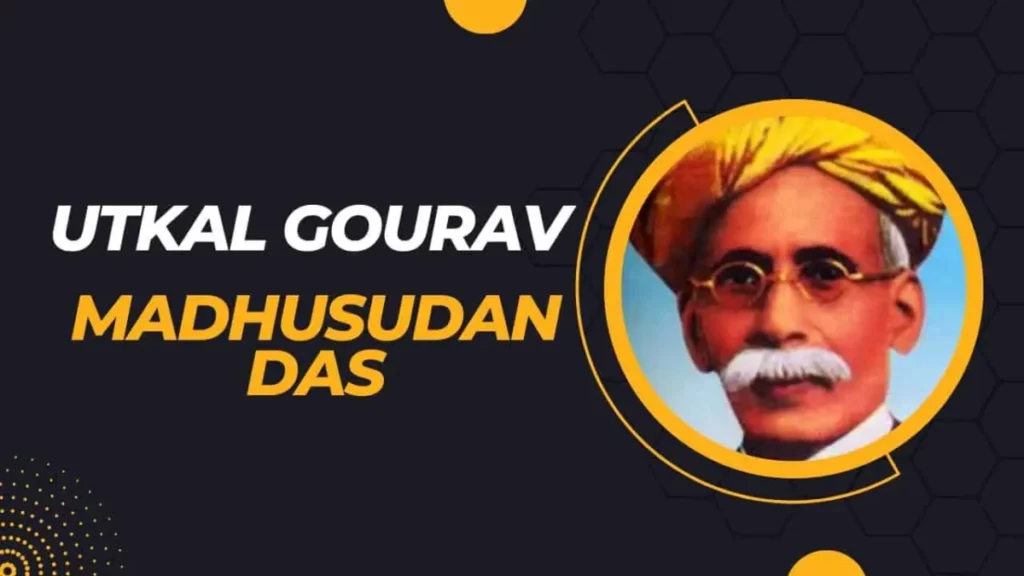Odisha, a state on the eastern coast of India, has a rich cultural heritage and a history that is intertwined with the luminaries who have shaped its destiny. One such luminary is Utkal Gourav Madhusudan Das, often referred to as the “Maker of Modern Odisha.” His contributions to the state in various fields have left an indelible mark on its development and progress.
Madhusudan Das was born on 28th April 1848 in Satyabhamapur, Cuttack district, which was part of the Bengal Presidency at that time. He hailed from a noble family and was raised with strong values of patriotism, education, and social service. His early years were marked by a thirst for Utkal Gourav Madhusudan Das knowledge, and he attended Ravenshaw Collegiate School in Cuttack and later pursued his higher education at Calcutta University.

His journey as a social reformer and political leader began during the Bengal Renaissance movement when he was deeply influenced by the ideals of freedom, democracy, and self-governance. Madhusudan Das saw the need for an independent identity for Odisha and actively worked towards the recognition of Odia as a separate language. He played a significant role in the formation of the Utkal Sammilani (Utkal Association) in 1903, which aimed to unite Odias and promote their Utkal Gourav Madhusudan Das language and culture.
Madhusudan Das was not only a champion of linguistic identity but also a strong advocate for education. He set up modern schools and colleges in Odisha, including Cuttack Zilla School and Ravenshaw College, with the vision to provide quality education to the youth of the state. Utkal Gourav Madhusudan Das His efforts laid the foundation for the educational institutions that continue to excel in Odisha today.
You can read our another post on Twin Temple of Gandharadi: A Marvel of Ancient Architecture
In addition to his contributions to education, Madhusudan Das played a crucial role in the political arena. He actively participated in the Indian National Congress and was one of the few leaders who represented Odisha on a national platform. His tireless efforts in highlighting the issues faced by Odisha in terms of economic disparity and administrative neglect led to the formation of the Utkal Gourav Madhusudan Das separate province of Odisha in 1936.
Madhusudan Das also had a vision for industrial development in Odisha. He established the Orient Paper Mills and took the initiative to set up the first industrial estate in the state. His foresight in promoting industries and attracting investments helped in the economic growth and employment generation in Odisha.
Apart from his political and social endeavors, Madhusudan Das was a prolific writer and poet. Utkal Gourav Madhusudan Das His literary works reflect his deep love for Odisha and its culture. His most famous poem, “Bande Utkala Janani,” became the state song of Odisha and continues to evoke a sense of pride and belonging among the people.
Utkal Gourav Madhusudan Das breathed his last on 4th February 1934, but his legacy lives on. His contributions in the realms of education, language, industry, and politics have laid the foundation for the growth and progress of modern Odisha. He continues to inspire generations of Odias with his indomitable spirit and unwavering commitment to the welfare of the state.
Today, as we celebrate the achievements and contributions of Utkal Gourav Madhusudan Das, let us remember him as a visionary leader who steered Odisha towards its glorious future. His ideals of unity, progress, and empowerment continue to shape the identity of Odisha and inspire future generations to strive for excellence and work towards the betterment of society.
Utkal Gourav Madhusudan Das will forever be remembered as the beacon of Odisha’s cultural renaissance and the architect of its modern identity. His legacy serves as a reminder that with determination and dedication, one individual can make a remarkable difference in the destiny of an entire state.
Write A FAQ For Utkal Gourav Madhusudan Das: The Maker of Modern Odisha
1. Who is Madhusudan Das and why is he known as the Maker of Modern Odisha?
Madhusudan Das was a prominent Indian politician and social reformer who played a crucial role in the formation of the state of Odisha in India. He is known as the Maker of Modern Odisha because of his relentless efforts in advocating for the separate identity and development of Odisha as a distinct state.
2. What were some of Madhusudan Das’s contributions towards the development of Odisha?
Madhusudan Das made significant contributions in various fields to uplift the social, educational, and economic status of Odisha. He played a crucial role in the establishment of Utkal University, Odisha’s first educational institution. He also worked towards the upliftment of socially marginalized communities, fought for women’s rights, and advocated for industrial and agricultural development in the state.
3. How did Madhusudan Das influence the political landscape of Odisha?
Madhusudan Das was one of the founding members of the Indian National Congress and actively participated in the freedom movement. He also played a pivotal role in the formation of the separate province of Odisha in 1936. His political efforts and vision laid the foundation for a prosperous and self-sufficient Odisha.
4. What were Madhusudan Das’s views on education and social reforms?
Madhusudan Das strongly believed in the transformative power of education and social reforms. He emphasized the need for education to be accessible to all sections of society, irrespective of caste or gender. He worked towards removing social evils like untouchability and child marriage and was a vocal advocate for women’s empowerment.
5. What is Madhusudan Das’s legacy in Odisha?
Madhusudan Das’s legacy in Odisha is immense and enduring. His contributions to the state’s development still resonate today. He is remembered as a visionary leader, a champion of social justice, and an architect of modern Odisha. His ideals and principles continue to inspire generations of Odias to work towards the progress and upliftment of the state.
